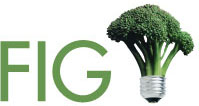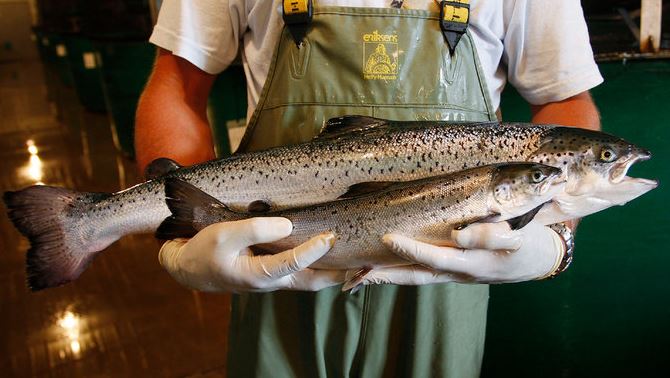The GMO battle has long been raging in the food industry. While the U.S. government and other groups claim that GMOs are safe, widespread consumer and environmental concern has given rise to a powerful anti-GMO movement. Many major food companies have already certified products through the Non-GMO Project and others are looking at how to source non-GMO ingredients. Currently, about 34,000 products are Non-GMO Project certified, representing roughly $13.5 billion in annual sales.
On November 19, the FDA approved the genetically engineered AquAdvantage salmon for human consumption, making it the first genetically altered animal to be cleared for this purpose. This decision has been met with intense controversy by groups like Food & Water Watch, who argue that the fish could negatively impact wild salmon populations, and lead to unforeseen environmental and safety consequences.
AquaBounty Technologies has genetically altered the fast-growing salmon to reach market size in as little as half the time of its non-engineered cousin. Supporters of the fish argue that it will allow for more sustainable and economical salmon farming, and reduce the overfishing of wild populations.
Currently, AquAdvantage salmon can only be raised within inland tanks to prevent them from escaping into the wild. AquaBounty has claimed these salmon will not be able to reproduce, although their sterility is not foolproof. Opponents worry that as the fish become more widely available the regulations governing their production may loosen; potentially resulting in escaped fish that could decimate their smaller wild cousins by out-competing them for food and resources, or even worse, taint the genetic pool through accidental reproduction.
Although it will be nearly two years before AquAdvantage salmon are widely available in the marketplace, consumers are voicing their protests and retailers are listening. Costco has refused to carry the salmon, joining retailers such as Whole Foods Market, Trader Joe’s, Aldi, Target, Kroger and Safeway. These companies carry a large percentage of salmon consumed by Americans – Costco alone sells an estimated 600,000 pounds per week.
Like genetically engineered crops, the FDA does not require that AquAdvantage salmon be labeled as ‘GMO,’ although companies can choose to voluntarily label their fish.
The AquAdvantage salmon is only one among many genetically engineered animals currently being developed. From mosquitos that cannot spread malaria to cows that do not grow horns, new techniques are allowing scientists to edit genes with relative ease. These advances threaten to outpace public consideration. With a stream of genetically altered animals poised to become available in the next few years, the need for continued discussion gains urgency. We’re no longer debating the future; we’re deciding the present.
What do you think the approval of genetically engineered salmon means for the food industry?
By Ashley Greco


